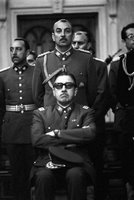Bumbling in The Orient
 REQUIRED READING
REQUIRED READING"Fiasco: The American Military Adventure in Iraq" by Thomas Ricks
Violent right wing movements tend to produce irrational foreign policies, leaving obtuse legacies for historians. It's hard for us to remember the immediate importance of places like Abyssina, The Sudetenland and Grenada. Iraq might be a little different. Later reviewers will understand its obvious importance as a buffer against Iran and as a secular state with pan-Arab nationalist designs, making it a very nice check on radical Islamism.
The current American leadership, however, sees another set of obvious important qualities in Iraq, most of which aren't abundantly clear. To get a stronger sense of why we're really there, you ought to read America's Secret War by George Friedman. Of course, it sometimes seems like sophisticated analysis of the situation is a fool's errand. While one hopes there's a more compelling explanation to all of this, judging by the outcome, reasonable people can sometimes be excused for believing that we're actually there to advance a clumsy and untested theory.
"Fiasco" by Washington Post military corespondent Thomas Ricks is a fantastic new book that explains how, rather than why, this all happened, and American military generals are the principal players in this drama. The overall themes are familiar to readers, but the particular relationships, personalities and decision-making processes are wonderfully illuminated by Ricks' original reporting.
One is left with the usual aching suspicion that Donald Rumsfeld and Robert McNamara are, in fact, the same person. Ricks doesn't make that point himself, though the obvious Vietnam comparisons in his account are striking. He convincingly demonstrates that CENTCOM Commander General Tommy Franks did not understand the difference between tactics and strategy. With neoconservative fantasies about Iraq shattering upon every intersection with reality, the military's need for a clear, useful strategy (i.e. 'what are our larger goals and objectives here, and how will we accomplish them?') was essential. Franks never seems to have realized taking the nation's capital was not the same as changing the regime. This book treats the military leadership fairly, demonstrating much of its considerable talent and skill (every general Ricks mentions seems to have a PhD from a distinguished university). The problem, more often than not, is the ultimate failure of the civilian leadership to make honest and accurate assessments and its incompetent organizational management skills. The reader is overwhelmed by the Administration's particular penchant for Orwellian language and Soviet-style upside-down logic in the face of unanticipated facts. After months of denying the reality of the insurgency, in April 2004, Joint Chiefs of Staff Chairman Richard Myers declared, “I think it’s that success which is driving the current situation, because there are those extremists that don’t want that success,” echoing the President's singular insight that insurgents "hate freedom."
The Proconsul for Iraq, Coaltion Provisional Authority (CPA) head L. Paul Bremmer, comes off looking particularly bad. His autonomous agency created an ambiguous and competing chain of command, undercutting the most important principle of successful combat operations: unity of command. His authority was dangerously undefined, and his decision to dissolve the Iraqi army and 'DeBaathify' the country's critical institutions, Ricks suggests, was done without Washington's blessing. Those decisions were also done against the recommendation of key military officers in the theater, and they were the most catastrophic blows to success in post-invasion Iraq.
Sensible policy never seems to have been very important in this adventure, be it in counterinsurgency operations, prisoner handling or the odious matter of Ahmed Chalabi. The overwhelming sense is of highly capable forces loosely unleashed toward a vague and clumsy enterprise. Ricks quotes retired Army Colonel Andrew J. Bacevich as he discusses the former commander of US ground forces in Iraq, "Historians will remember Ricardo Sanchez as the William Westmorland of the Iraq War, a general who misunderstood the nature of the conflict he faced, and thereby played into the enemy's hands."
It is easy to forget we won every battle in Vietnam and still lost the war. Military and political leaders apparently lost sight of why we were in Vietnam in the first place.


0 Comments:
Post a Comment
<< Home